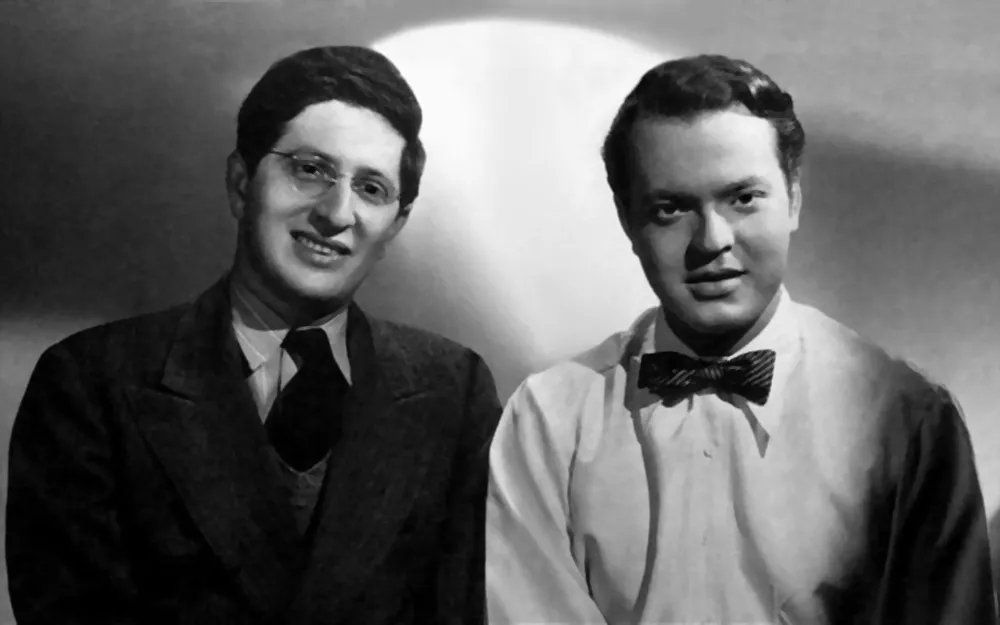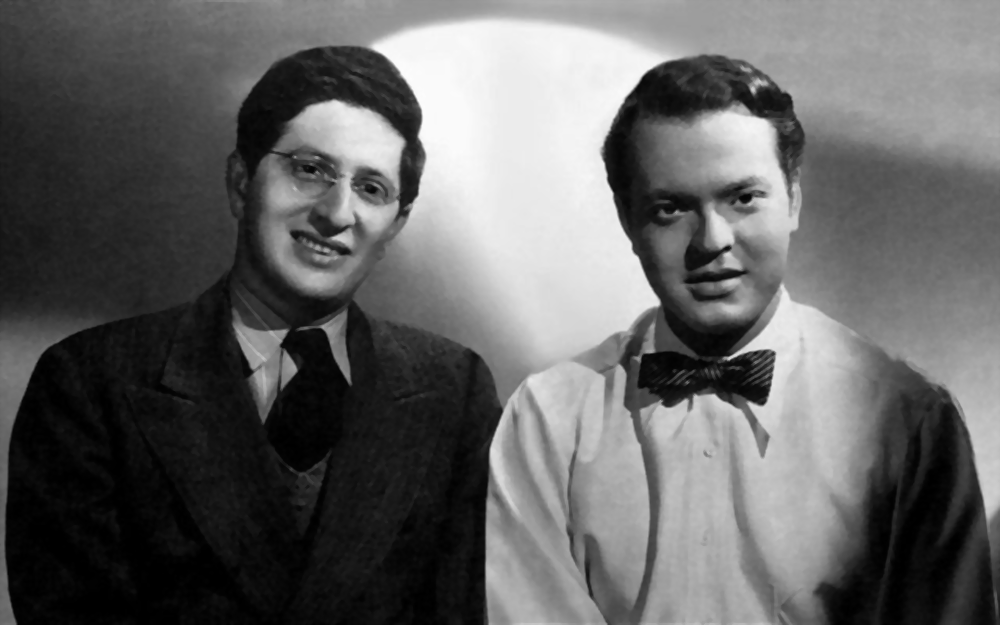Music in Motion Pictures

Publisher: Music Publishers Journal
Publication: Journal - September / October 1945, pp 15, 17, 53, 54, 69
Copyright © Robbins Music Corporation 1945. All rights reserved.
A Reply to Mr. Leinsdorf by Bernard Herrmann
-
In last Sunday's Times,* Erich Leinsdorf indulged in a favorite sport current among many of our interpretive concert musicians - that of belittling film music. As one who is also a conductor of a symphony orchestra, besides being the composer of a considerable amount of film music, I would like to take issue with his criticisms.
In the first place, he seems upset by the fact that music in films must of necessity be incidental. He declares that music in any “subordinate” place is “odious” to a musician. I fail to see what he means by the word “subordinate.” If film music is subordinate, so is music in the theatre and the opera house. Music in the films is a vital necessity, a living force. Had Mr. Leinsdorf ever seen a film in the projection room before the music was added, he would understand thoroughly how important the score is.
Music on the screen can seek out and intensify the inner thoughts of the characters. It can invest a scene with terror, grandeur, gaiety, or misery. It can propel narrative swiftly forward, or slow it down. It often lifts mere dialogue into the realm of poetry. Finally, it is the communicating link between the screen and the audience, reaching out and enveloping all into one single experience.
If this role is “subordinate and secondary,” then so is the role of opera music, which, no matter how extended, is governed finally by the needs of the drama. So it is with the best film music. It identifies itself with the action, and becomes a living part of the whole. Obviously, few film scores could bear the scrutiny of the concert audience without being radically rewritten. But, similarly, even the Wagnerian excerpts which are performed by our symphony orchestras seem amputated when they are torn from their rightful places on the stage.
Film music is necessarily written to supply a particular moment of drama, and it is memorable only when it remains wedded to the screen. As such, the medium has produced masterpieces. Aaron Copland's sardonic commentary on the monotonous supper of the bored married couple in OF MICE AND MEN; the father's hopeless search for work so eloquently expressed by Alfred Newman in THE SONG OF BERNADETTE; the sound of the sinister jungle done almost entirely by percussion instruments by Franz Waxman in OBJECTIVE BURMA; Serge Prokofieff's terrifying Battle of the Ice sequence in ALEXANDER NEVSKY; and the coal delivery scherzo of Anthony Collins in FOREVER AND A DAY - all are classics of their kind.
Mr. Leinsdorf makes a great point, in his article, of criticizing the use of music in scenes of a so-called “realistic” nature. He is annoyed by the presence of an orchestra playing a “nineteenth century romantic piece” during a scene showing a railway terminal, and feels that sound-effects would have sounded much better. He also objects to the use of a musical motif depicting rain in a storm sequence, when the real sound of rain falling could have been used.
Without knowing what scenes in what pictures he is discussing, it is a little difficult to answer this point. Certainly the music in the particular scenes he saw might have been ill chosen. But again perhaps the composer was trying to achieve some psychological effect or atmospheric quality which could never have been attained through sound-effects on a dead screen. The examples of film music I have just mentioned above are all cases in point.
Contrary to all rumor, there is no such thing as the “standardization” of motion-picture music. The only “standard” for film music is that it be dramatic. Perhaps this is something Mr. Leinsdorf does not understand when he deplores the fact that many of our modern composers have given up working for the screen. Might it not be, simply, that these composers, though their talents are of sterling quality, lack the dramatic flair?
The whole point I have been trying to make is that screen music is neither industrialized nor insignificant. Indeed the films and radio offer the only real creative and financial opportunities a composer has. He can write a film score for any musical combination and hear it immediately performed. Moreover the film gives him the largest audience in the world - an audience whose interest and appreciation should not be underestimated. A good film score receives thousands of “fan letters” from intelligent music lovers everywhere.
* Herrmann’s statement appeared in the New York Times 24 June 1945 in reply to the following article by Erich Leinsdorf
Some Views on Film Music by Erich Leinsdorf -
In motion pictures, music, generally speaking, is merely one of the many arts employed to create an effective production. Except in those pictures where music emerges naturally through the singing, playing, or dancing of one of the performers, it takes its place with photography, lighting, and costuming as an accessory to the dramatic content with the purpose of heightening the mood or special effects. While this subordinate position is hard for a musician to accept, enough attention has been given to motion picture scores and enough composers have rearranged their movie works for concerts to make such consideration worth while.
Perhaps I have not seen enough movies to voice an opinion, but it seems to me that the most satisfactory scores have been in unrealistic or fantastic pictures. Realistic movies, I think, would do better to depend on actual sounds rather than musical imitations of them, on the noise of a train, for example, rather than on instrumental interpretation of the sound of its wheels.
I would say that the best cinema scores I have heard come from documentary movies where, apparently, the narrative technique gives the composer more scope than is provided by dramatic feature films. Some of these scores can stand alone as music. Their composers seem less trammelled by conventions, and create scores that are imaginative, timely, and individual.
There is a certain timidity and conservatism about almost all movie production that might explain this. Just as the morals and conventions of movie plots lag behind the actual mores of 1945, so does much movie music date back to the last century. Motion picture music avoids new ideas even as motion picture plot content avoids controversial subjects and original thinking. Consequently, the music that goes with romantic sequences is a dismal potpourri employing the glutinous conventions of the nineteenth century. The devices are hackneyed and out of date, but they are served up like a tour de force of passion and feeling, overdone and in bad taste. These sequences scarcely conceal their affinity to the hearts and flowers school, and I think the public will eventually criticize them out of existence.
One serious aspect of the problem is the effect that the motion picture industry is having on our music and musicians as a whole. When I was in Los Angeles recently, several young musicians came to me to talk about going back into symphony orchestras. They had been working for a number of years exclusively in movie studios, where they were making fantastic sums of money, but where the work did not satisfy them musically. Such work means that the musicians take a little tune and record it over and over for ten or fifteen hours. They are well-paid hours, but the musical mind is not touched or satisfied.
Unfortunately, when I told these musicians how much they could expect to make with a symphony orchestra, their enthusiasm waned quickly. Certainly this means that more and more talent is being centered in the lucrative fields of movies and radio. Live orchestras compete with these industries on decidedly unequal terms, for only a minority of people find that better music and finer work compensate them for the sacrifice of higher wages.
I know one composer, however, who did forego his fancy Hollywood salary. When I asked him why it seemed impossible to find very good music in the moving pictures, he answered me with his own experiences. He said that he himself had left the movies because he felt they were doing him harm. “I started out,” he said, “by having an assignment to compose a score for a big western movie. It was a good score, and everyone liked it, and it went well with the picture. And a few months later I had another assignment to do another score for another western picture. After the third or fourth western picture, I asked if I couldn't have a different assignment because I didn't want to write altogether for western pictures. I knew I could write different kinds of music. I was not allowed to, of course.”
Specialization is one of the things that happens in an industry. My friend had to write western music because through his first endeavors he had become a specialist in western music. But imagine the mind of a composer faced always with doing the same thing! Music, however, is not a science, not a business, not a factory. It is an art, a means of human expression - and you don't specialize. The efficiency expert approach of industry to art has caused specialization to make considerable inroads on the broader musical field.
In a motion picture musical comedy, for example, the score heard by the movie audiences is actually the work of half a dozen people, each one contributing a little in his own line. One man is responsible for composing the tunes, and sometimes he does not even harmonize them, although, to be just, that is the exception. Not one, but a group of arrangers are called in, since one specializes in hot jazz, another in sweet arrangements, and so on down the line.
Originally this was a matter of expediency in the popular music field, but the idea of specialization is beginning to penetrate deeper and deeper and to reach over into the more traditional sphere of serious music. This is no service to the musician, because it hampers his normal development. Nor is it beneficial to the audiences, who receive a blurred impression, theory, or picture, as the case may be, from work that is a result of a combination of personal talents.
One of the essentials for better motion picture music is a new attitude that seeks higher standards through less standardization. No one, of course, can say whether or not it will be generally achieved.




